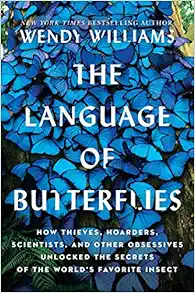Dr. Goldmeier manages an investment firm, a former Research and Teaching Fellow at
Harvard University, and teacher to international university students in Tel
Aviv. He served in the administrations of
US governors and the Surgeon General. Goldmeier a commerce and industry
consultant, writer, and public speaker.
No More Border Mentality
The butterfly teaches us how the world is changing. Their language might
save our planet. We have to appreciate their importance to the human food
chain.
Military security is no longer bound to physical borders or magic marker lines
on maps. Mass migrations, terrorists, satellites, rockets, and drones reveal
the anachronism of borders. Assuredly, there are doctors without borders,
lawyers without borders, libraries without borders. The Internet demolished
intellectual border hegemony.
Do you know who else ignores borders? Butterflies, moths, and honeybees
migrate across man-made borders. These tiny insects know no bounds.
I realized the threat to the world food chain a decade ago. Mass crop
displacement happens when honeybees disappear. Butterflies and moths are under
threat. Food shortages and high food prices undermine national security.
I wrote about the situation in The Jerusalem Post after interviewing
Professor Chancing (Alex) Lu of the Harvard School of Public Health. Folks at
Hebrew University’s Triwaks Bee Research Center (see The Robert H. Smith
Faculty of Agriculture, Food and Environment) are leaders in this field of
research.
Wendy Williams explains it all in a luscious, readable, scientifically
informative book, The Language of Butterflies: How Thieves, Hoarders,
Scientists, And Other Obsessives Unlocked The Secrets Of the World’s Favorite
Insect (Simon & Schuster Paperbacks, 2021). She laces her love for the
beauty and majesty of butterflies with science. This science journalist “was
never again so deliciously, so exquisitely, so naively shocked” about art and
color until she entered the world of butterfly obsession.
She describes in 200 pages her Lepidoptera epiphany. “An entire universe
opened to me. I learned that the language of butterflies is the language of
color. They speak to each other using that flash and dazzle.”
Science and Sex
These six-legged creatures and a proboscis revolutionized our understanding
of nature.
“Today (they) are helping us in many practical ways, improving our own lives
by providing surprising new models for medical technology.”
My son breathes easier with bio-designed devices because of what we learned
from butterfly scales. Studies of the monarch and painted lady butterflies
teach scientists about maximizing the capillary force of the proboscis to
transport columnar liquids.
The science of sex has seldom been more intimately described: “The proboscis
is where the rubber meets the road. Where insect and flower join together in
joyful partnership. It’s a marriage not just of convenience, but of sustenance.
Flowers, with their alluring scents and sweet nectary, tempt the insects to
come hither. The insects, while obtaining nectar (or “nectaring…) inadvertently
obtain pollen, which they obligingly but unintentionally carry to the next
flower, so that the flower is fertilized by a new set of genes.”
Some butterflies change their colors to avoid being eaten by predators.
Caterpillars eat poisonous plants they can digest to keep their predators at
bay. An Indian butterfly can disguise itself as a dried-up old leaf. When it
opens its wings, “blue colors flash and dazzle in the sunlight, along with wide
stripes of gaudy orange.”
Butterfly-inspired structural designs millions of years old led a NASA scientist
to “discover” the gyroid. Built from lightweight materials, it allows for
almost infinite energy flow. The work of naturalist and artist Maria Sibylla
Merian led to Newton’s prism separating light into a rainbow of colors. “A team
of Australian scientists has already mimicked this butterfly’s gyroid to create
a human-made 3-D structure… for use in computer technology by replacing
soldering boards.”
Williams includes 34 color pictures that illuminate the text. She laces the
book with stories about scions and raconteurs who buy, sell and steal
butterflies. The stories add spice and amusement.
A World Without
Williams warns their populations are precipitously dropping. Loss of their
esthetic value is criminal. “The disappearance of butterflies would be a
planetary disaster.”
Butterflies went extinct in Britain in 1979 and nearly so in Europe. 35
years passed before butterfly friends turned things around. America, once home
to marauding swarms of butterflies, is down in great numbers. Butterfly migrations
are not rote like birds. Butterflies integrate climatic changes into their
behavioral decisions.
Butterflies and moths find refuge around Mount Hermon in Israel. We stuffed
the coast and central parts of the country with forestation, farms, industrial
centers, and housing-office developments. It is unfortunate that with 93% of
the land of Israel in the public domain, only 14 species of butterflies and
moths are under protection.
The Takeaway
Butterflies, moths, and honeybees need substantial wetlands, nectar-filled
fields of flowers, and milkweed to thrive and survive. They have hardy survival
skills in managing predators and climate changes.
It is whimsical that Israelis have any patience for building an
environmental protection agenda with all on the plate. Yet, it makes perfect
sense. Every inch of land is holy, contested, and the fruit of raging battles
between militaries, developers, naturists, and farmers.
Wendy Williams offers a fascinating tale of human-nature interaction set
around one of God’s most beautiful creations. She advocates for them in the
most romantic and captivating language. Who can think of a butterfly and not
smile? I smiled often reading The Language of Butterflies.
Reach thousands of readers with your ad by advertising on Life in Israel


No comments:
Post a Comment